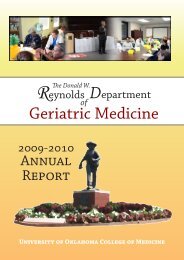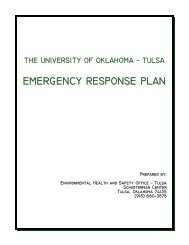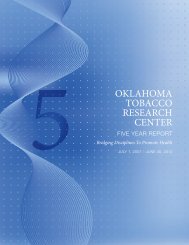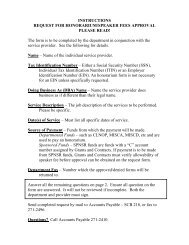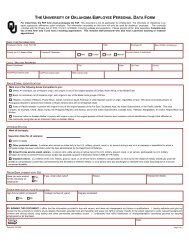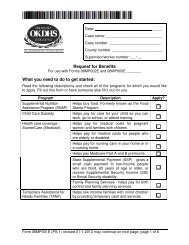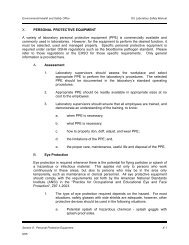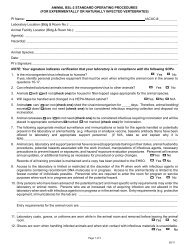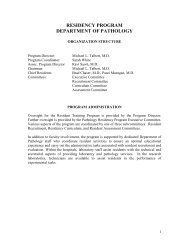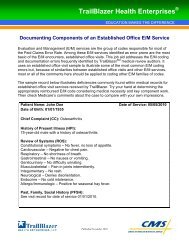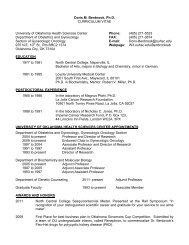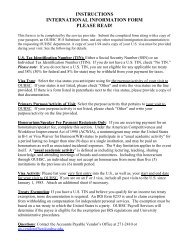The Unofficial Guide to First Year - University of Oklahoma Health ...
The Unofficial Guide to First Year - University of Oklahoma Health ...
The Unofficial Guide to First Year - University of Oklahoma Health ...
You also want an ePaper? Increase the reach of your titles
YUMPU automatically turns print PDFs into web optimized ePapers that Google loves.
UNOFFICIAL GUIDE<br />
Medical<br />
Physiology<br />
a.k.a.: “Phys”<br />
Hours: 109<br />
When It Hits: Spring<br />
Course Direc<strong>to</strong>r: Dr. Robert Blair, BMSB 653B, 271-2226 ext 226<br />
SECTION<br />
G<br />
OVERVIEW<br />
Good news and bad news. <strong>The</strong> bad news is Phys is widely thought <strong>of</strong> as the most<br />
challenging course in the first year, but the good news is that many also find it<br />
the most interesting. I loved it because, as opposed <strong>to</strong> memorizing all the little<br />
muscles in the foot (and forgetting it a week later), all the material you learn in<br />
this course is actually important in the practice <strong>of</strong> medicine.<br />
It’s difficult because instead <strong>of</strong> just rote memorization <strong>of</strong> structures, you have <strong>to</strong><br />
memorize concepts and then be able <strong>to</strong> put them <strong>to</strong>gether on the test in ways<br />
that may not have been specifically demonstrated in class. A deep understanding<br />
<strong>of</strong> the material along with critical reasoning skills is required <strong>to</strong> do well in this<br />
course.<br />
One point I would emphasize throughout the entire course is this: DR. BLAIR<br />
IS YOUR FRIEND! Although he doesn’t really teach any <strong>of</strong> the individual<br />
sections, he is ALWAYS approachable for questions if you just can’t understand<br />
the material taught by its original teacher. Also, I would recommend addressing<br />
him in person, as opposed <strong>to</strong> corresponding through email. He is the course<br />
direc<strong>to</strong>r for two classes in the spring semester and tends <strong>to</strong> get bogged down with<br />
an incredible amount <strong>of</strong> email, so he may not respond immediately or at all.<br />
EXAMS<br />
<strong>The</strong>re is ONE KEY TO SUCCESS ON THESE TESTS: PRACTICE<br />
PROBLEMS! <strong>The</strong>se exams are <strong>to</strong>ugh. Even if you memorized the entire<br />
syllabus, most <strong>of</strong> us are not smart enough (or at least I’m not) <strong>to</strong> walk in<strong>to</strong> the<br />
test without ever having applied the knowledge we’ve attained while studying.<br />
<strong>The</strong> problems provided on Hippocrates and Blackboard are very similar <strong>to</strong> ones<br />
that will be asked on the exam. <strong>The</strong>se are not only an ‘indica<strong>to</strong>r’ as <strong>to</strong> how far<br />
along you are in studying, but they help you integrate all the information in your<br />
head and make it much more accessible during the exam. I probably worked<br />
through every practice problem at least three times, and it paid <strong>of</strong>f. <strong>The</strong>se are<br />
72




